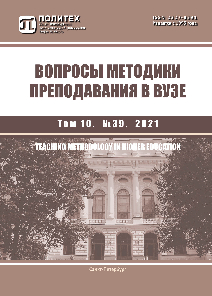Differentiated approach to teaching students professionally oriented reading within the framework of the "Foreign language" discipline
The presented paper deals with the reading as a type of speech activity, as well as a differentiated approach, and the possibility of its application in order to intensify the process of professionally oriented training for reading texts in a foreign language to students of non-linguistic universities. In order to pursue this goal, the authors of the paper study the theoretical basis of the differentiated approach, its differences and application possibilities in foreign languages teaching, consider reading as one of the types of speech activity, as well as in the framework of such a pedagogical sphere as professionally oriented training. According to the theoretical analysis of papers dedicated to the same subject-matter, it was found that the differentiated approach provides not only the removal of difficulties for students in studying professional and language material and increasing educational motivation, but also the activation of speech reading skills in general. This thesis is confirmed in the course of pedagogical experiment including two stages of diagnostic and control testing, as well as basic training, distributed at the current level of language skills development, reading foreignlanguage texts for the students of Peter the Great St. Petersburg Polytechnic University majoring in economics and management, in a foreign language course. Based on the data obtained in the course of the pedagogical experiment, the use of a differentiated approach is proved to be an effective didactic tool, in particular, for professionally oriented teaching of reading in a foreign language, due to its variability and ease of implementation within the language course. It is also established that this approach and its elements may be applied as an effective basis for both the development and improvement of speech reading skills, and for the increasing efficiency of students' learning activities.



